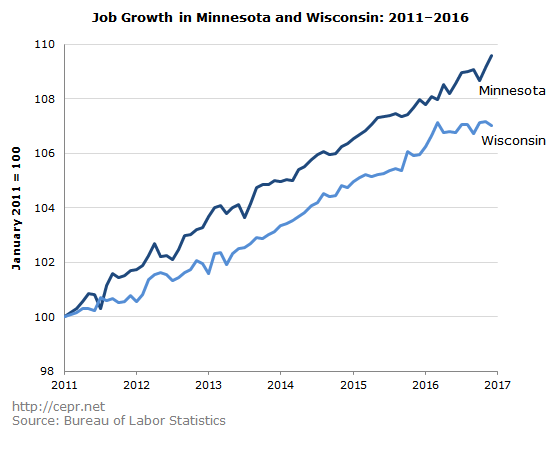February 27, 2017
In 2010 Wisconsin elected Scott Walker as governor, a conservative Republican. At this time, Republicans also controlled both houses of Wisconsin’s legislature. Neighboring state Minnesota elected Mark Dayton, a liberal Democrat. Democrats also controlled both houses of Minnesota’s legislature. Both governors were re-elected in 2014.
The two governors took their states on diametrically opposed courses. Walker cut taxes and paid for them with cuts to spending in education and a number of other areas. He also deliberately confronted the state’s public sector unions. He prohibited contracts requiring that all the workers who benefit from a union contract pay for their representation, along with several other measures designed to weaken unions. Later he signed legislation applying the same restriction to private sector contracts.
By contrast, under Governor Dayton, Minnesota raised taxes on the wealthy and used the money to improve the quality of education in the state. The state also raised its minimum wage, which now stands at $9.50 an hour for large firms and $7.75 for small employers. In contrast with Walker, Dayton has maintained good relations with Minnesota’s unions, which are an important part of his political coalition.
Both governors argued that their agendas were the best way to boost growth and create jobs. Thus far it looks like Dayton has the better case.
Since the start of his administration in 2011, Minnesota has created more than 250,000 jobs, a gain of almost 10 percent. By contrast, Wisconsin’s economy has added 190,000 jobs, an increase of just over 7.0 percent. The comparison is shown in the graph below.

While this simple comparison is hardly conclusive, clearly the liberal policies pursued by Minnesota under governor Dayton have allowed the state to enjoy healthy job growth. At the same time, the conservative policies pushed by Governor Walker have not had any obvious economic benefit for the bulk of Wisconsin’s citizens.






